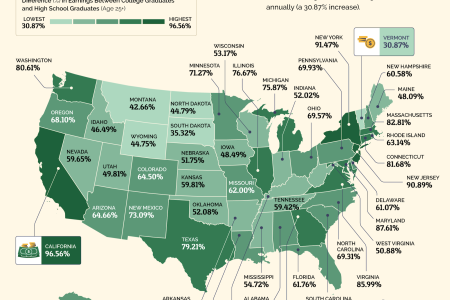In the realm of entrepreneurship and career advancement, the decision to pursue higher education often comes down to a critical analysis of cost versus opportunity cost. This analysis becomes even more pertinent when considering the financial implications of obtaining a master’s degree compared to entering the workforce with a bachelor’s degree.
With the average income for bachelor’s degree holders at $60,000 per year and the cost of a master’s degree running at $30,000 per year over two years, the decision is not merely financial but strategic.
Understanding cost and opportunity cost
Before delving into the specifics, it’s essential to differentiate between cost and opportunity cost. Cost refers to the tangible expenses incurred during the pursuit of education, such as tuition, books, and living expenses. Opportunity cost, however, represents the income or benefits one foregoes by choosing one path over another. For an aspiring entrepreneur or professional, understanding this distinction is vital for making informed decisions that align with long-term goals.
Related: Exploring the Intricate Interplay of Education, Income and Entrepreneurial Success
The financials: A closer look
The average cost of obtaining a master’s degree is $60,000 over two years. This figure does not account for ancillary expenses, including potential interest on loans, which can further increase the total investment. On the surface, this cost is counterbalanced by the promise of a higher average income post-graduation, which stands at $80,000 for master’s degree holders.
However, this simplistic view overlooks the opportunity cost associated with pursuing a master’s degree. For two years, an individual forgoes an average income of $60,000 annually, amounting to $120,000 in lost earnings. This figure significantly impacts the net benefit of obtaining a master’s degree, especially when considering the time value of money and potential investments that could have been made with the income earned during this period.
The entrepreneurial perspective
For entrepreneurs and those with a keen eye on career advancement, the decision to pursue a master’s degree is not solely about immediate financial returns. The value of higher education often extends beyond the paycheck. Advanced degrees can provide invaluable networks, specialized knowledge and credibility that can be particularly beneficial in certain industries or entrepreneurial ventures.
Moreover, the skills and insights gained during the pursuit of a master’s degree can lead to more significant opportunities, potentially resulting in ventures that far exceed the income differential between bachelor’s and master’s degree holders. Therefore, while the opportunity cost is a critical consideration, it’s also essential to weigh these intangible benefits.
Calculating the break-even point
To make an informed decision, one must calculate the break-even point of their educational investment. This calculation considers the total cost of the degree, the opportunity cost of lost earnings and the differential in post-graduation earnings. Specifically, with a total financial investment of $180,000 — comprising $60,000 in tuition and $120,000 in lost income — it would take nine years of working at an $80,000 annual income to break even. When including the two years spent obtaining the master’s degree, the total time investment to reach a break-even point is precisely 11 years.
This break-even analysis is crucial for those contemplating a master’s degree, as it provides a clear timeline for when the financial benefits of the degree will start to outweigh the costs and lost earnings. It’s a vital consideration that requires individuals to take a long-term view of their career trajectory and financial goals.
Related: The Most Effective Way to Become a Millionaire Is Still Through Education. Here’s Why.
Beyond the numbers: The value of education
While the financial analysis of cost versus opportunity cost is crucial, the decision to pursue a master’s degree should also consider personal and professional growth. Education is not merely a financial transaction but an investment in one’s capabilities, worldview and potential to impact society. For those with a clear vision of their career path or entrepreneurial goals, the value of a master’s degree might far exceed its initial cost and opportunity cost.
Moreover, in an increasingly complex and competitive global economy, the depth of knowledge and expertise gained through a master’s degree can be a significant differentiator. This is particularly true for entrepreneurs who seek to innovate and lead in their respective fields.
Making the decision: A strategic approach
The decision to pursue a master’s degree, with its inherent costs and opportunity costs, requires a strategic approach. Prospective students and entrepreneurs should:
-
Conduct a thorough financial analysis, including the calculation of the break-even point
-
Consider the intangible benefits of higher education, such as networking opportunities, skill development and access to resources
-
Reflect on their career goals and the role that a master’s degree might play in achieving those objectives
-
Explore alternative paths to acquiring the desired skills and knowledge, such as professional certifications, online courses or practical experience
In conclusion, the analysis of cost versus opportunity cost in the context of higher education is a complex but essential exercise for entrepreneurs and professionals. By taking a holistic and strategic approach to this decision, individuals can align their educational pursuits with their long-term career and entrepreneurial aspirations, ensuring that their investment yields not just financial returns but personal and professional fulfillment.
Related: How to Get a Master’s Degree Without Going Into Debt
Read the full article here









